#balkan folk magic
Link
Putting my anthropology degree to good use and compiling a bunch of credible sources documenting real life Balkan folk magic traditions in one easy, convenient article!
I know so many sources about witchcraft are inaccessible and or culturally appropriative, so I did a lot of research and wrote this easy to digest article covering some basics of South Eastern European folk belief. I’m thinking of writing more articles about various European folk traditions (when I have time!) so this will be an ongoing project. I hope you learn something new and meaningful to incorporate into your craft 💗
An Introduction to Balkan Folk Magic
Like many old world practices, traditional Balkan magic has historically been carried out by cunning folk, healers and seers who were gifted in communicating with the “other world”. These community healers practiced generational family knowledge, remedies and prayers passed down from elders. It is important to note that most cunning folk did not view themselves as witches, rather they were seen as conduits for god’s miracles. Within a historical context, these practitioners very much considered themselves Christian, Muslim, or Jewish. Elements of paganism lingered in many rural regions, though they were absorbed into the social-religious fabric of the day. Rituals performed by cunning folk were typically protective, either preventative or as a treatment for supernatural maladies. Spells shielded people from harm, physically or spiritually.
Many of these traditional healers and diviners were women. They passed down knowledge to their daughters, granddaughters, and nieces. Men weren’t barred from practicing, it was just rarer for them to perform these rituals. These traditions are often tied to the family, home, or the community. Many magical rituals shared common themes, but were often specific to a singular family. The women who performed these rituals and divined their neighbors’ futures are known as bajalica, bajanje, basmara, bajarica, or bajaluša — or “conjurers that heal with words.” Bajalica and those they helped held the belief that spirits have the power to afflict illness, charms, and hexes. Bajalica are the mediators between the spirit and human worlds.
In Serbian folk belief, each family has their own protective spirit or slava. Families would celebrate them with dedicated rituals in which they made offerings of bread, sacred water, wine, and oil, as well as lighting incense and sacred candles. These spirits or saints are associated with the hearth, the heart of the home, which is considered the most sacred ritual space. During healing rituals bajalica call upon the slava, drawing and channeling their power to strengthen spells. These spells typically involve a verbal component, whispered incantations that call upon saints and spirits for help in casting evil away. These verbal formulas are highly specific to each bajalica, often times mumbling well remembered words to rid patients of their misfortune.
Spiritual afflictions are found through various means of divination, digging for the root cause. Divination has long been used to predict the fates of those who seek out the conjurers. These methods include reading tarot, casting beans and interpreting patterns (also known as favomancy), molybdomancy (casting and reading molten lead), reading tea leaves and coffee grounds, and gazing into copper bowls filled with water beneath the moonlight and interpreting patterns in the reflection. Divination was and is, the main way to discover the root of “spiritual sickness”, who hexed whom, if one was afflicted with the evil eye, the urok. Much of Balkan folk belief centers around protection from the evil eye, with the majority of spells dedicated to banishing or warding.
Various regions and countries have their own means of protecting oneself from the evil eye. In Albania people use dordolec, house dolls, that are elaborately dressed and displayed in gardens or atop homes to protect against the malicious urok. In modern times most dordolec are stylized scarecrows or stuffed animals, but the intent is the same. It is believed that the doll reflects the covetous gaze back on the perpetrator and shields the home’s inhabitants. Other amulets in Albania, Serbia, Bosnia, Bulgaria, and various Balkan countries are dried snake heads between two holy medals made of silver, objects made of iron, cloves of garlic, the hand of Fatima or hamsa, and the nazar.
Again, most rituals heavily focus on protection magic — not just from the evil eye, but malevolent spirits as well. Bajalica will employ the ritual use of knives, broom whisks, sickles, and axes in healing and warding spells. Though these are physical implements, they are tokenistic, a form of sympathetic magic. Knives and other sharp implements are used symbolically, cutting away illness and curses from the spiritual self by slashing bowls of water or the air around the afflicted person in increments of 3 or 9. These are considered sacred numbers. After the symbolic cuts are made, the water is spilled at a crossroads away from the home. This leads the evil away from the community.
Healing rituals have many intricate components. Conjurers often employ various herbs in healing and blessing water such as basil, thyme, oregano, Saint John’s-wort, sage, and mugwort. Other healers might cleanse spaces and energies with a smoke bath made of similar herbal blends. Not only do healers use ritual tools, they often perform physical acts, such as performing knot magic and binding spells using colorful yarn. The yarn is typically red, black, or white. White yarn is used in healing rituals, red in binding magic and love spells, and black is used in binding as well — though it is sometimes used for darker, malicious purposes.
The folk practices of South Eastern Europe are heavily entrenched in doing acts of good. Healers serve their communities, curing ailments and casting protective spells. Many of these traditions still exist in some capacity and are practiced equally among Muslim, Christian, and Jewish Balkans. Though many of the rituals have a religious faith based element, they can be adapted to secular, agnostic, or polytheistic belief systems. These practices date back hundreds of years and by choosing to incorporate them into your craft, you are helping keep rich and beautiful traditions alive.
(sources available at the end of linked article)
#folk magic#folk healing#witchblr#witchcraft#balkan folk magic#balkan culture#my writing#eclectic witch#wicca#pagan#divination#tarot#tasseomancy#tasseography#sympathetic magic#book of shadows#grimoire#knot magic#anthropology#beginner witch#baby witch#witchcraft basics#evil eye
495 notes
·
View notes
Text
Among Balkan witches, rope was rarely used, but in contrast, yarn was obligatory. As a rule, they would use any kind of yarn; the only thing that mattered was it's color. White, red, black, and sometimes gold colors were used.
White yarn was exclusively used in healing rituals. After a bundle of necessary items for the sick person was prepared, witches wrapped it three times with white yarn, then it was tied with three knots while they chanted an appropriate incantation. Repeating the incantation while tying each knot. The bundle consisted of a piece of white canvas, a personal effect of the sick person, or a few hairs, or an herb was used to treat the sickness at hand. Sometimes just a lock of hair was bound with white yarn, and while the knots were tied, the incantation was repeated.
Red yarn was used for everyday situations. It was most used in love magic first for "binding" a couple, then for material benefits, but also for protection from any evil. The method of performing the ritual is identical to the previous one , meaning that while the knots were being tied, the appropriate incantation was repeated for each knot.
Black yarn was used exclusively for black magic, with the methodology as in the previous examples. It is well known that black yarn is used in Vlach "binding", and according to that, we can conclude that this type of love magic is black magic.
- Balkan Traditional Witchcraft by Radomir Ristic
#balkan witchcraft#balkan folk magic#south slavic#balkan#Radomir Ristic#traditional witchcraft#yarn magic#fiber witchery#folk magic#slavic folk magic#balkan folklore#folk healing#black magic#holy queue
50 notes
·
View notes
Text
《Jandrija》
Original character reference sheet and description

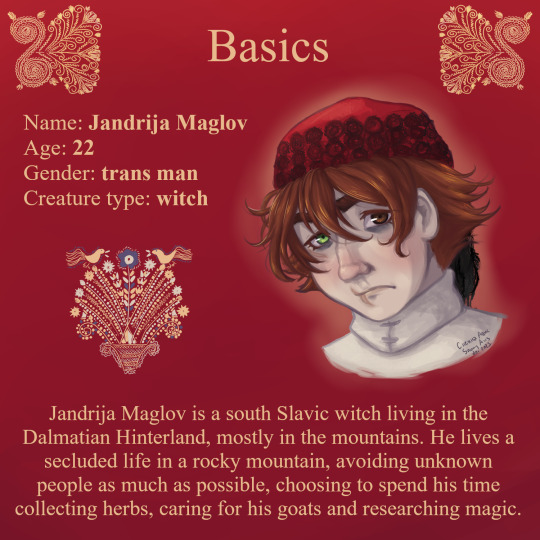
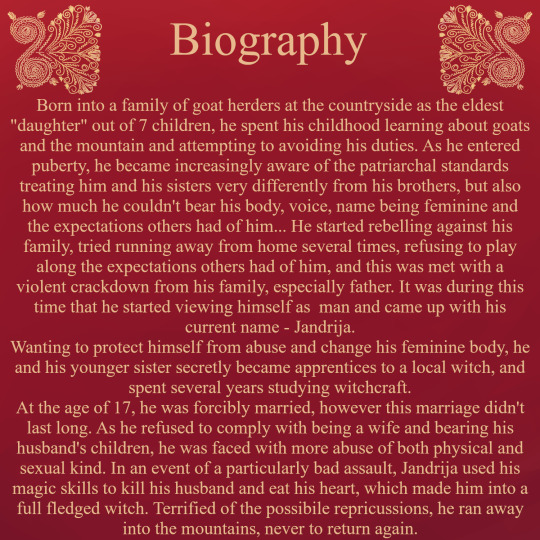
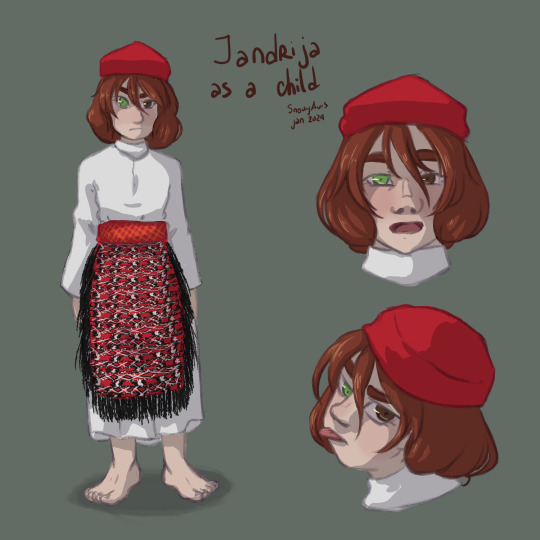
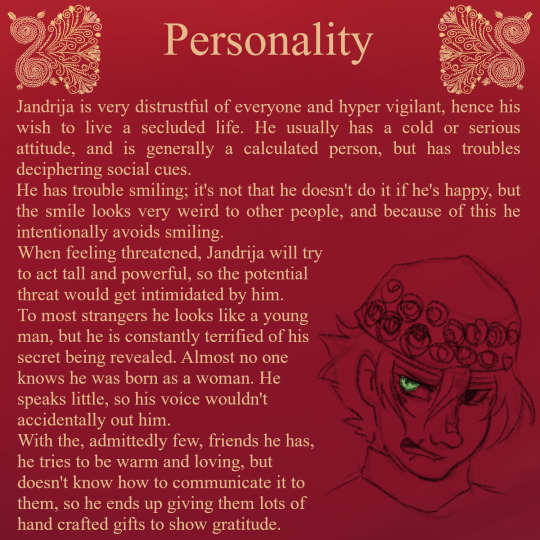

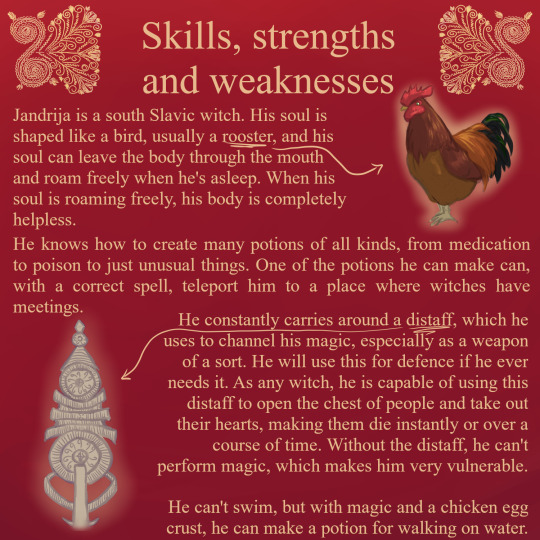
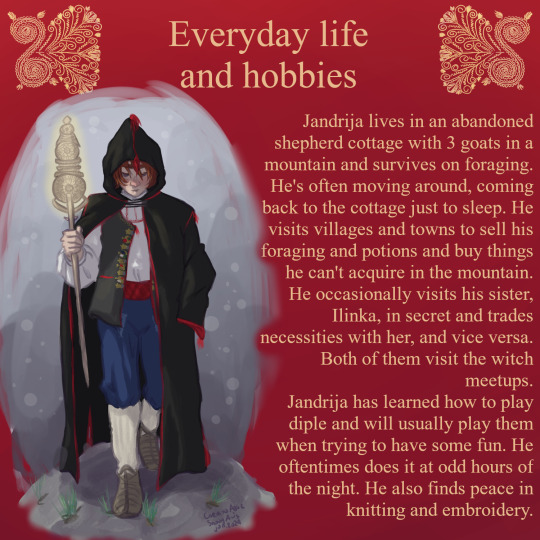
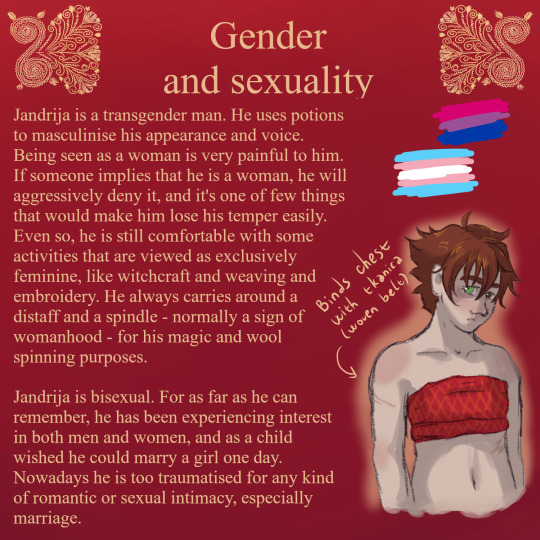
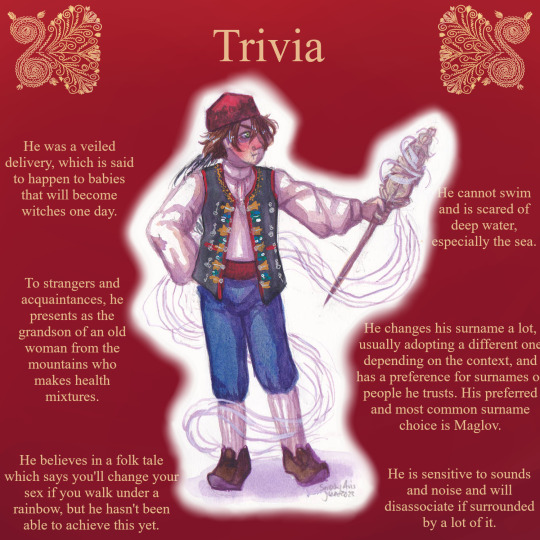
#art#reference sheet#artwork#Dalmatian#dalmatia#balkans#balkan#witch#witchcraft#traditional clothing#folklore#folk dress#croatia#croatian#south slavic#slavic witch#digital art#magic#artist#fantasy#serbian#transgender#trans#queer#bisexual#original character#oc#oc art#oc reference
28 notes
·
View notes
Text

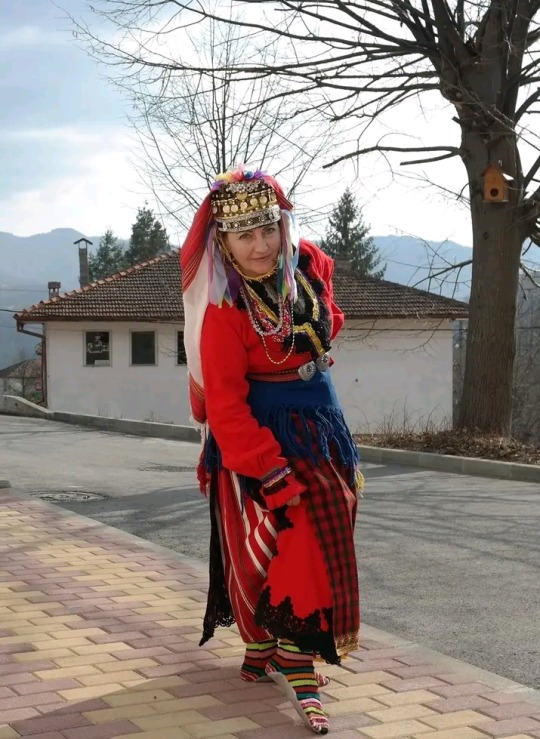
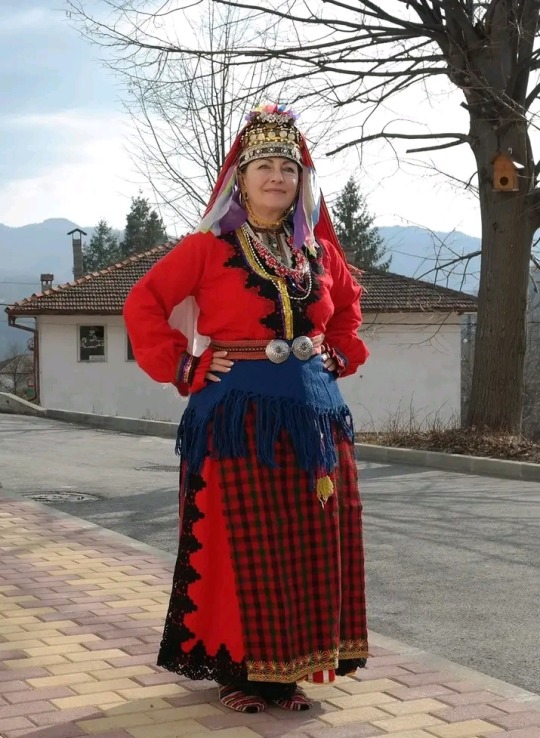
Traditional festive clothing from village of Varbina, Madan area, Bulgaria
#bulgaria#traditional clothing#bulgarian#balkans#balkan folklore#slavic people#slavic#bulgarian folklore#slavic folk magic#balkan fashion#muslim#pomak
23 notes
·
View notes
Text

Objection.
Please say England when you mean England, our Balkan ass would never. If we here had loads of some magical thing people would make dust and dishes clean on their own and make some infinite baklava loop or make themselves immune to alcohol poisoning certainly not what Kaito is doing
#blashphemy#give me magical power to make meals cook on their own and trash teleport into dumpster#edit: i take back everything I said if you give magic to a balkan folk they'd probs use it to make their neighbor explode#or something like that
7 notes
·
View notes
Photo
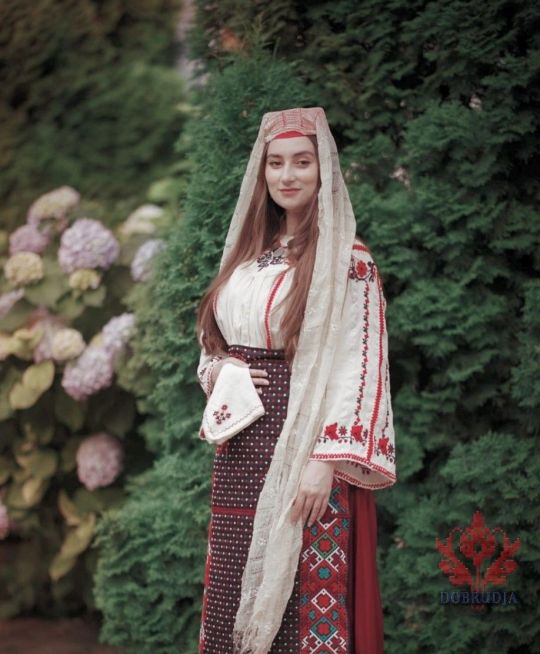
GeoFolk 2022 - Traditional clothing of Dobrudja, Simona Niculescu
#geofolk#balkan#dobrogea#romania#heritage#folk#magic#traditional#dobrudja#simona moon#niculescu#constanta
22 notes
·
View notes
Text
Excited to find more information about the balkans and Southern Slavic practices.
21 notes
·
View notes
Text
y’know what i AM gonna say it-- imagine being born into your village medicine woman’s family. seeing your mom treat people, interpret signs and dreams, helping women give birth safely. learning your grandma did the same, and her mother before her, and so on and so forth for decades, maybe centuries
and then going nah i’m gonna follow this chickenshit god that says women are inferior and i’m gonna break this long line of wise educated women <3 who cares about all that priceless information of herbs and natural signs and folk rituals and traditions, when i can just kiss yahweh’s pampered ass!
#like i'm so mad#i'm always so baffled whenever i remember the women in my family were all witches and moase until my grandma broke that#and for no reason#and nowadays she's not even religious anymore?? like#she completely abandoned everything#didn't even pass on that knowledge in a secular way#just squandered it#is it not enough that romanian (and slavic and balkan in general) folk magic is going extinct#we barely know anything about our former gods and spirits
8 notes
·
View notes
Note
Hi Theitsa! half Greek in America here, looking for translation help and you're the only blogger I know 😭
long story short: my family on my mom's side all practice Greek folk magic, with my great-grandma and(possibly my great aunt)apparently being "completely" a witch.
i grew up with it but i'm still learning the language and my family disowned me for being gay so I can't ask for help with research.
the most commonly used term for "witch" is "magissa"/ μάγισσα right?? is μαγεία more common for magic in general? when I'm using Google translate γητεία seems to be the most common term for folk sorcery.
and i see the practices of Circe referred to as μαγγάνεια??
thank you for your help if you know anything, I know it's a niche topic.
bless you!!!
Hii! Dear anon I'm very sorry for what your family did to you :/ That's nor fair at all! May you thrive and be always blessed in your life!
This topic is not niche, actually! The average Greek in the country has some basic contact and knowledge of such stuff either by doing some or by hearing of them. I haven't talked a lot about Magganeia/Vaskaneia in Greece so let's do a Masterpost!
(Greeks with deeper knowledge please add to this post and let me know if something is inaccurate! All I have is "average Greek" knowledge but well, someone has to make the start.)
People throughout Greece (as in the whole Balkans and the Middle East tbh) practice a lot of customs to bring good energy and good things to them or expel bad energies and bad things. The most prevalent being the ritual of xematiasma (the prayer for which needs to be passed down by the opposite sex on a full moon), or customs with bridal koufeta for young girls to attract a good groom, reading the coffee and the palm, explaining dreams (and having recorded oneirokrites), giving new year talismans for good luck (mati beads, pomegranate charms, horseshoes) and hanging them around the home, or baking a pie to St. Fanourios if you want to find something you lost etc etc.
Traditionally such practices in Greece are intertwined with local customs and herb knowledge and it's not a big "issue" like it would be for USAmerican (cultural or practicing) Evangelicals. In Greece it's acceptable to do many things that in the US would be considered "witchcraft" but here they're just "tradition".
For Greeks the basic stuff I mentioned in the first paragraph is widely accepted to the point many of them have fused with church practices through the centuries. Coffee shops where one can have their coffee and palm read - although not many - have lots of customers. Tarot readers also have a good clientele. I've heard Greeks dismiss such stuff as "nonsense" but rarely dismiss them as "evil". Actually, the comments about such practices being evil here are very tame and usually connected to the church - but not in the US way.
Our Church might have cried about such practices in the past but... who listens to the church on these things! :P (only a few do) Our insistence on keeping folk practice led to Greece having no witch hunts or any witches burnt for at least a thousand years now!
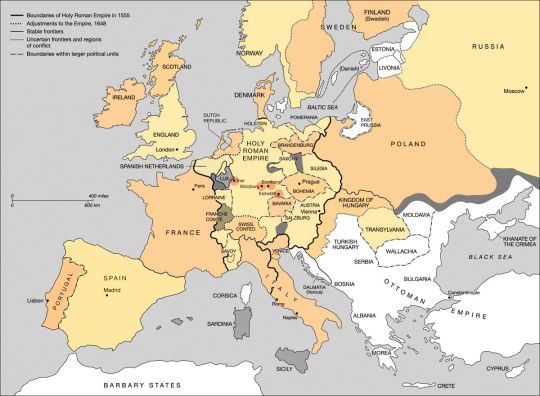
Map of witchhunts in early modern Europe (source)
There is a line here, too, of course. Like, if one uses a heart from a mouse wrapped in an oak leaf bathed in frog bile to expel the bad spirits (a spell I just made up) that's officially "witchcraft" and we find it weird at best. More mild stuff like burning wishes written on paper or letting garlic absorb bad energies and then burn it are middle ground and not outright condemned - I feel the Greeks have a great tolerance of what is considered "folk tradition" to them.
The fear of being "pagan" in recent centuries is a Western panic. Traditionally Greeks and their Church were most worried about harmful spells (which included harming an animal or human in the process) and calling demons to do your bidding. If you called a saint for help in a non-harming spell... hmm that wouldn't be that worrying I guess. As long as you didn't ask a priest's opinion, you'd be fine :P
The sum of acceptable and unacceptable practices by the Greek public can be called "μαγγανεία" or "βασκανεία". Because they include unacceptable practices as well, the words have a negative connotation.

"Μαγεία" for Greeks is connected more to the Western archetype of a wizard with a tall hat going around with a big rod shouting "abracadabra". It's connected more to fantasy and fairytales. Traditionally I don't think we used μάγος/μάγισσα for people who did such practices. Even today I've yet to hear Greeks who call themselves witches say "κάνω μαγικά".
I'd say μαγγανεία or βασκανεία are the appropriate terms for what your great-grandma practiced. The spells are traditionally called γητείες (sing. γητεία). The word γόης which now means "very charming man" meant "sorcerer" in ancient years. We just use it metaphorically today. These words all have the same linguistic root.
Nowadays I haven't heard men call themselves "μάγος" but some women call themselves "μάγισσα", and they do "ξόρκια" (comes from εξορκισμός, exorcism - the English version of the Greek word). I think "μάγισσες" practice more Western types of magic because they learned the spells from Western European or US books and videos. I don't know if a practicer of Greek folk spells would be called the same.
I must note that all the above is the reason why when USAmericans practice Greek customs to worship the Greek gods and call themselves "pagans" feels a bit unsettling to me. I suppose if you add crystal balls and tarot and crystals to the practice that would shift it more to the "witchy" side (although as a Greek I'm quite flexible :P) But more than once I've seen USians call themselves "pagans" for simple acts of worship which are very much non-pagan. Having a home altar with the gods along with some blessed items and candles burning... is Basic Christian Orthodox stuff too, a tradition unbroken from ancient years (εικονοστάσια με καντήλια, κεριά, λουλούδια, κομποσκοίνια).
At the same time, I understand that in their society this can be called "being pagan" so I'm not saying that my view is the only one that matters in this. But some knowledge of the Greek culture always helps if you're practicing its customs. It will also help the Westerners stop calling Orthodoxes "savage pagans" for our religious practices after a thousand years :))))
Thanks for making it this far! Get a small bonus: a great article on ancient Greek "bindings/wishes" which is in Greek and it will be probably still fine if translated through Google.
Some things might differ between areas and eras so that's why I welcome other Greeks to comment here with their own experiences and stories of "witches" (or whatever they called them) if their areas had any.
21 notes
·
View notes
Text

I'm bored and I can't find motivation to draw, have my headcanons for Romania instead, some of these are simping and cringe, enjoy:
(Also adding a image to be easier to find this post cause for some stupid reason tumblr only shows posts with images in my blog's search bar now, tags are useless)
♤♡◇☆
1) Three words for this guy: 🌟Tall, blonde and beautiful.🌟
2) He's a fashion genius or a fashion disaster depending on your view but he still got drip.
His color choices are black and red (like no shite), sometimes blue for the jeans and warm colors in general, white and grey from time to time.
3) I'd consider him quite mixed, with some ethnicities leaving a noticeable influence but latin conquers most of his bloodline nowadays.
The slavic tendencies come out whenever he gets drunk.
4) Folks see him as eccentric... they're right.
5) He's one of the few countries with particular traits that are uncommon to the rest of the nations and society in general.
I could say it's magic if I want to be basic about it, but I don't, so here's some of them:
His eyes can see supernaturals like spirits, fairies, ghosts and demons although they rarely make their existence know nowadays.
Technically since he's a vampire that would make him one as well. (Actually I'll make a post about this)
He can communicate with the animals and understand them but won't act on it to not look crazy. So he doesn't visit the zoo too often.
He's interested in dark magic so you can say he vibes with the dark side too. In addition he's way too casual about the creepy factor of some things.
He can poses fire because I said so.
6) Besides the quirks about paranormal, he's charming, both in looks and personality as well until you get to know him better, then he gets a little silly that could mean anything.
The only canon thing I adopted from him is that he's mischievous, but I could make him worse :3
7) He's good with kids, he'd be one of those cool parents if he had any. (I could make parent headcanons)
8) He likes traditional food the best, anything with meat and potatoes but to be frank no one can resist pizza from time to time. He doesn't eat too salty, makes him thirsty easily.
He like savarine as a sweet and usually buys them, but if he wants home made he would chose lemon cake (snow white).
To be honest he eats a lot but at least he keeps himself in shape.
"What do you mean this bread has sugar in it??" He doesn't like american bread.
9) And he definitely is lean build, someone who survived 2 empires and russia isn't gonna be skinny af just because he doesn't show it.
My vision says his body beats the twink allegations, his face not so much... he's a twunk.
10) Speaking of, I like to think he does gymnastics and extreme sports for the thrill.
11) His imagination is wild so if he'd have a modern job it should be something that expands on it.
Like a writer for books or movies. He can cook well too (and mix all kinds of potions) so maybe a chef at a restaurant, Fashion artist, Modeling... I go for the writer though.
12) He has some scars on his body, most are small and unnoticeable but he's too self conscious about them so he's not wearing a lot of revealing clothes, at least he doesn't sweat much during summer.
Two noticeable scars are on his shoulder blades and one besides the left lilac region to lumbar.
The ones on his back I like to think of them as a metaphor for broken wings. The one below his abdomen happened due to his separation from Moldova.
13) Cat person, cat behavior and cat lover. He has at least 2 cats in his house and a little bat because why not?
One of the cats is a lynx because that's his national animal, but also because it's like having dog size cat, a big pile of fluff to snuggle on rainy day, a purring machine against your head and belly (I'm projecting a lot I know)
14) His relationship with his slavic neighbors, mainly balkans, is very capybara coded. He's just chilling around and none of them has any business with him nowadays. He's considered part of the family despite Romania being latin. He may feel more accepted by them than his family from west sometimes.
15) His relationship with his blood relative is kinda mixed and they don't communicate often, assumingly because of his status but proly because of the land distance as well.
He used to look up to them and hoped to be accepted and recognized as a romance country in the past. One out of two happened, he's content enough with that.
16) He drinks a fuck ton of red wine.
17) His fangs are the only teeth that can still fall and regrow, he's able to move and retract them.
18) The pupils in his eyes are vertical stilts that expand and contract, the thinner they get the more blurry everything besides the focus point becomes. Sometimes he wears glasses for that.
Funny thing about his pupils is that they can expand so much it cover the whole Iris. His eyes can also glow in the dark sometimes.
19) In human age he's 23.
20) He loves parks, a lot.
21) Keeps his house clean except his kitchen, until he has guests over. If uninvited you're not allowed in the kitchen.
22) Sleep schedule worse than you've seen in college. Get him to bed or he gets grumpy af.
23) Coffee addict because of that.
24) He doesn't like cold, but there's melancholic beauty in the landscape whenever it's night time and only the tree lights give an ounce of warmth during winter. It's a bittersweet sensation he can't describe properly, it's the same during rainy days or stormy nights. He likes it despite the ache feeling it gives.
25) Sunny days are enjoyable for many of his activities but he's usually more active during the night, which is unfortunate because he ends up sleeping too much during daytime and feeling awful for "wasting time" in bed.
26) His eye color switches from black to red sometimes.
27) Sexually speaking, he's definitely swinging both ways and sideways.
28) If he'd be a yōkai then it's Kitsune (nine tails fox) fits him the most. Also because I like to think he'd have a double pair of fangs from it.
29) I main ship him with: Bulgaria and Norway. Side ships: Greece and Hungary. Crack ships: Prussia, Japan, Belarus. Platonical: Egypt cause I like their aesthetics together.
30) But talking about how compatible he is with other characters. I'd say based on canon he is with Bulgaria. Based on history he'll be with Serbia (dude barely exists). Based on his zodiac sign he's with Hungary (the irony). Based on his mbti he's with either Norway or Japan.
31) Speaking of zodiac signs, he's a Sagittarius. (Although it's hard to identify precisely the "birthday" of countries, so I just go with their national days and his is on Dec 1) if you're into astrology a lot then he also has his moon in scorpio.
32) He is inclined to be overprotective for his close ones ever since he lost Moldova to Russia. He does it automatically without knowing until someone points it out.
♤♡◇♧☆
This may get updated from time to time
31 notes
·
View notes
Note
What do you think about (as an idea for a slight retcon to explain the Maximoff twins’ background without removing Natalya from their story) Magda actually BEING Natalya? As in, when Magda is presumed dead after giving birth, she actually took on a new persona as Natalya and started a new life as a witch? This way, Magneto and Magda could still be the twins’ parents. I feel like it’s iffy because Magda is Western European and Natalya is likely Eastern European implying they’d be from different vistas (sorry, I’m not 100% sure that this is the proper term) but I think it would be the best way to bring back the old story without undoing the new one.
I gotta tell you, that would be really hard to pull off. I mean, Marvel is no stranger to sloppy retcons, but if you actually care about good writing, I think it'd be tough. First of all, in Scarlet Witch, Wanda encounters a past version of Natalya from before the twins were born, and she's already a witch, already going by that name, etc. Second, multiple living characters attest that Natalya was Django's brother and had been living-- and doing magic-- in the Balkans her whole life.
So, you need to find a way to account for all that. If Natalya, as a character, existed in a vacuum, then maybe it would work, although I really don't like that almost every Romani woman in comics is a witch, so I'd like to keep Magda out of that if possible.
On that subject, though, if we are going to continue employing Romani witch archetypes, I want to do it in a way that speaks authentically to this part of Romani history.
As I understand it, things like folk magic and divination, in the Romani community, are usually family trades, and were historically practiced as survival work, so, for most people, it is something that goes back several generations. A lot of those skills, like cartomancy, were developed by applying Romani ancestral customs to European folkways, and many of our communities do still have closed and/or initiatory spiritual traditions.
I don't have all the right answers, but I feel very strongly that if Wanda's magic is hereditary, it does need to be a part of a family lineage. My dream would be to really incorporate this part of Romani history into the Marvel canon in a way that changes outsider perceptions of witches and gypsies in genre fiction for the better. That's a lofty goal, and I'm not the right person to do it-- I'm sure you can imagine that this is difficult to talk about in a way that respects our cultural boundaries, and you end up walking a really fine line between representation and affirming stereotypes. So, it's just really hard.
Anyway, that's why I kind of love Natalya as she is, and I want to believe that something really positive could be done with this character. In the same vein, I actually really like that Magda is just an ordinary lady-- her story's really dark, but it's important for people to be reminded of Romani Holocaust victims, and I worry that we would be taking away from that if we made her into a magical being.
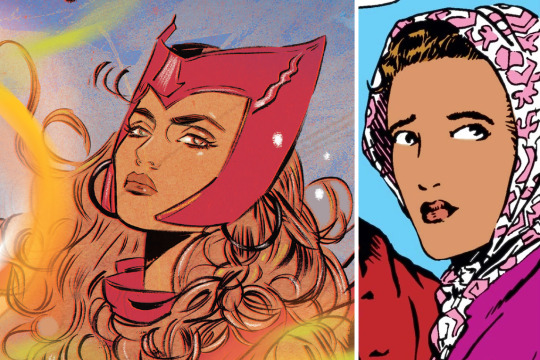
In this house we stan two unique, individual, and equally important Romani mothers!!!
The word you're looking for is "vitsa," which, in this context, is used to describe distinct groups or communities within the global Romani diaspora. Those distinctions are not technically based on geography-- it's more about lineage and dialect-- but, yeah, in Europe, they tend to be regional. It's not a hard rule, or anything. My family lives really far north from where you'd think to find Cale people, but that's who we are! I don't think it's ever explicitly stated, but we can infer from context that Magda is Sinti. She is actually one of the few Romani characters in comics with an identifiable vitsa. The fact that the Maximoffs don't have one can make it harder to nail down "authentic" details, which is sometimes frustrating.
23 notes
·
View notes
Note
do u know of any resources for balkan folk magic & witchcraft?
Hi nonny!
The balkan region isn't my area of expertise but I do have a few things that you may find helpful.
This post from @junipersprigs
The author Radomir Ristic published 2 books on Balkan witchcraft before he passed away. I own "Balkan Traditional Witchcraft" by him & it's got a decent amount of information and a bibliography. I assume his other book is the same way.
This YouTube channel was run by a lady from Serbia. Sadly she also passed away a few years ago, so there aren't any new uploads.
There are also little documentaries on YouTube like this that might have good bits of info in them. (Take everything in it with a grain of salt especially because it's produced by Vice🤢).
I'd also check Academia.edu, Jstor & a lot of folk and ethnography museums have websites with a board of academics who publish their research. If it's behind a pay wall, it cant hurt to track down the author & just ask if they'd be willing to send you a copy to read. A lot of the times they're more than happy to & if you can definitely donate some money to them to support their work.
Following tags like "Croatian folklore" or "Serbian witchcraft" here on Tumblr, IG & other social media platforms could be helpful too & you'll likely find other practioners who could help you more than I can. Translating those keywords into that native language & saving those helps too. For example, I have both "Ведьма" & the English spelling "Vedma" saved which means "witch" in Russian. Hopefully I explained that in a way that makes sense.
Also learning the language & using the web browser most common in whichever country/region will be better than using Google.
I'm a big advocate for reading the work of folklorists, ethnographers & other professionals rather than Wiccanized New Agey garbage. Learning from the people who live and breathe the practice is probably the best way. So, if you're able to, find a practioner near you who'd be willing to teach you. If you cant but you have ancestors from that region, I'd highly recommend asking them to help you. There's gotta be at least 1 person in your bloodline who's willing to.
This was kinda rambly but that's all I got. I hope this helped give you a good place to start. If anyone wants to add more resources to this post, please feel free to.
32 notes
·
View notes
Text
《 Usamljeni pastir - Lonely shepherd 》

#art#oc#traditional art#folk dress#fantasy#magic#artist#balkan#balkans#dalmatia#dalmatian#mountains#shepherd#dalmacija#south slavic#slavic#folklore#traditional clothing#croatia#croatian#serb#water colour art#water colour
25 notes
·
View notes
Text
Bulgarian traditional festive clothing from Sliven region, Bulgaria
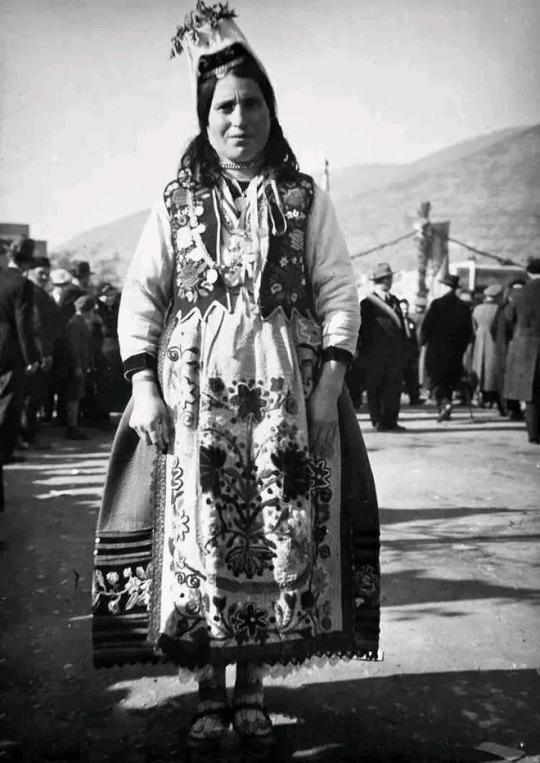
#bulgaria#traditional clothing#bulgarian#balkans#balkan folklore#slavic people#slavic#slavic folk magic#bulgarian folklore#balkan fashion#slavic folklore#folklore
29 notes
·
View notes
Text
Folk Practitioner Survey Results
We had a total of 87 people take part in this survey, so thanks to all of you who submitted your responses! I won't be posting every single response to every question, because that would be way too much to fit here. Instead, I will show the charts available and mention the responses to questions that stood out/weren't repetitive.
Written responses will be quoted, and if I have any commentary to add it will be noted with an ➳ arrow.
The first question was asking about the person's general age, which resulted in the following:

The second question asked about what the individual practices, which resulted in the following:

The third question was optional, specifically catered to those who selected the "other" option. We got a variety of results from this, but to simplify it, the following folk practices were mentioned in those results: Welsh, Filipino, Caribbean, Cornish, Hoodoo, Australian, Brujeria, Jewish, Romani, Hungarian, Transylvanian, Brazilian, Dutch, Western American, Japanese, Finnish, Dutch, French, Scandinavian, Polish, Jeiwsh, Midwestern American and Lithuanian.
The fourth question asked about their ancestors homelands and where the individual came from themselves. Specifically, if they came from the region their folk practices originated from or their ancestors. This resulted in the following:

The fifth question was optional, specifically catered to those who selected the "no" option. We asked why did they choose the folk practices they follow. There weren't many responses that weren't repetitive, but I'll post this one so you can get an idea on what most people said:
"For the Slavic practice, neither myself nor my ancestors came from the region - however it has been calling to me since I was young and their stories and cultures have reached me in my soul. I do my best to not involve myself in ancestry or cultural rites I haven't been invited into, but some I have as I've traveled through the Balkans"
The sixth question asked if the individual was a generational practitioner, reconnecting, mentored or learning by themselves. This resulted in the following:

The seventh question was optional, catering to those who selected the "Not generational; I am learning by myself currently" option. It simply asks how are they learning, which resulted in responses such as the following:
"Mainly by reading books about Appalachian folk magic and following tumblr pages about it"
"Research through as many mediums as I can get my hands on. Academic histories, biographies, other practitioners online, podcasts. I try to cast my net as wide as I can so I have multiple sources that I can contrast and compare."
"books, science articles, personal experience, journaling, cause and effect"
"I have books of Scottish folktales that I try to sieve for info, I have a website full of folktales. I'm looking into witchcraft books written in/about Scotland."
"Not being mentored by any one person re: Appalachian/Ozark magic, but given general guidance and advice by a number of practitioners in the region. Self taught for the rest."
"Somewhere between reconnecting and taught. Took much of my practice from observation of my relatives but I was missing key pieces so I'm going through family accounts and works written by other folk practioners in the region to fill in the gaps."
"Online resources and folklore books mostly"
"Reading. Translating when I have the energy to do so."
"I am learning through research, talking with other folk practitioners from the same areas, and asking other people from my country/region about stories/superstitions!"
"Good ol' internet sleuthing (including JSTOR documents), repudated books, folk witch covenmates on discord, podcasts by authors I like"
➳ A small note I'd like to add; I myself do not believe people can truly learn the folk practices directly related to specific regions without speaking to generational practitioners/folk practitioners native to those regions, but I do applaud many of these people for digging up old books and translating them.
The eighth question asked why the individual chose their folk practices. These were some of the results:
"Other forms of work just didn't work for me, then came the realization that what my Granny did when I was little was a type of magic and I dove headfirst into it."
"It’s a part of my culture and religion. My parents taught it to me and it makes me feel connected to my heritage and my family."
"The adaptable nature and the instinct of it, I grew up with many of the practices just labeled under superstitions instead of magic."
"It's comforting and familiar, it makes the most sense in my head."
"I feel like I resonate with it more. Forgive me, but it's not as hippy-dippy as some of the other magic crafts I have seen. It comes from a place of ancestry and history."
"I’m not a fan of any new age stuff…I remember almost being turned away from magic because i thought it was all love and light with a bunch of yoga teachers….until a brilliant folk witch swept me off my feet and put me in the right direction."
"Truthfully it's the path of least resistance. It makes sense to me in a way that learning other systems never did. It gives me connection to my ancestors when as a queer person that relationship was fraught."
"Folk magic has established traditions that are still highly adaptable"
"To connect with my past and my ancestors. Although I am not white, I grew up in a very white environment, which was rather isolating."
"I find it comforting and it brings me meaning."
The ninth question asked if the individual believed their folk practices are closed, semi-closed or open. This is a topic that tends to be debated a lot, and unfortunately I can't narrow down the results much more than this, so here is the chart:
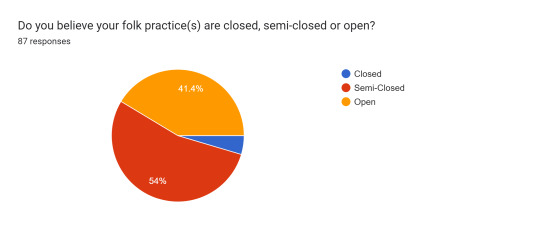
The tenth question asked to explain their reasoning for the previous question, but I failed to require people to include what folk practices they were speaking on in this question so I'm going to skip over this one.
Many of the responses summed up to "It's open, because if you feel called to it that should be enough" or "It's semi-closed because although many traditions are open, you should be living on the land it's from/learning from generational practitioners/much of it is oral tradition". Those who selected "closed" were dominantly bipoc individuals who were speaking on hoodoo, brujeria and things of that nature.
The eleventh question asked everybody to select the religion (or lack of) they followed. These were the results:

The twelfth question asked if religion (or lack of) impacted the individual's practice in any way. These were some of the responses:
"Yes. I incorporate the worship of God into my practices"
"No it doesn't. I keep my religion and my practice very separate due to quite a bit of Christianity related trauma."
"They are intertwined! The christian part anyway. I keep my pagan practices separate."
"I've definitely had to make compromises with a few spirits because of my personal beliefs but we cool"
"Yeah i struggle a lot with how religion fits into my practice as i am From primarily Christian areas. It’s something i am still working through"
"Yes, Christianity is very tied to Appalachian folk magic but I’m not longer Christian so sometimes it can be hard to balance being atheist with the strong Christian traditions of the practice."
"I identify as pagan and often times struggle to make folk practices which are heavily influenced by Christianity fit my deities and what I want to work with."
"A lot of folk magic is intertwined with Christianity. I'm not over the moon about it, but I understand why. I'm trying to see if it makes a difference if you separate out the Christianity versus leaving it in."
"Raised culturally Christian but Norse pagan now, but am attempting to incorporate certain Christian beliefs (saints, novenas, etc) into my own practice, since a lot of the texts/sources we have are from after the conversion of Scandinavia."
"Not particularly. I keep things separate."
And, finally, the last question simply asked if anybody had anything to add onto their submission for the survey. Here are a few responses that stood out to me:
"If you hear whistling in the woods at night no you didn't :)"
"I enjoyed answering these questions. It has brought some things up in my mind that I need to contemplate for a while. Thank you for that."
"I can’t stand witchcraft social media spaces. Incredible levels of disrespect done against all cultures and practices, meanings and definitions change and become more trendy than sincere. I can’t be a part of a community like that."
"I'm not very articulate and I'm certianly afraid of this coming across the wrong way, but I think there's too much infighting in different esoteric communities when half the time we're doing silly little spells and charms and yes, religion and spirituality are deeply personal and powerful subjects, but the fun in it came from me when I thought how ridiculous it is that my grandma on my dad's side knew mustard seed in a necklace would give me good luck and a wish, or that my baba knew that crosses on the window panes that she traced with fingers dipped in olive oil would keep the house safe. None of these things mean anything except that they mean everything."
"Trans rights"
"Personally, I think we lost something when folk magic began to go on the decline. Throughout all human history magic has been there. Now we have new age people and such. lmao"
"Even if you only just moved to a place, immediately research it's folk traditions cuz they're yours now, too. Chances are as a newcomer you prolly have something new to bring to the potluck as well. Just cite your sources, always."
Thanks to everybody who took part in this survey! I got a lot more responses than I initially expected. I was expecting no more than 30, maybe 40 tops. Yet there were 87. Y'all had me shook lol
98 notes
·
View notes
Text
I FINALLY have folk metal band list that spans all the inhabited continents
Let's go by continents!
Diablo Huma- Equador
Hiddenland- Equador
Cemican- Mexico
MiracleOfSound-Ireland (look up his songs Sirona, Grainn Mahoil and Tale of Cu Chullain)
Alestorm- Scotland (it's pirate metal but some people count it?)
Tyr- Faroe Islands
Percival- Poalnd/ Pan slavic
Arkona-Russia
Rune-Serbia
Manntra-Croatia
Brkovi- Croatia (more of a punk band but look up their song "Ovce" a MAGICAL blend of rap,metal a, punk and folk influences)
Metaklapa- Croatia (This one is weird ... they do covers of metal songs in traditional Dalmatian singing style .. for example they did Aces high)
Dubioza Kolektiv- Bosnia & Hertzegovina (DO NOTE! This band is called a band with no genre for a reason! they varry from Regge R&B To Folk-Metal-Punk ... compare their "Space song" and "No escape from Balkans")
Arka'n Asrafokor- TOGO
(also worth of note is Skinflint from Botswana but they don't ussualy have much folk elements)
Al-Namrood- Saudi Arabia (They played metal when it was punishable by death... IT DON'T GET MORE HARDCORE THAN THAT!)
Hassak- Kazakhstan (it's an ethno band but listen to their song Amanat and tell me it don't belong on a metal concert)
The Hu- Mongolia
Wagakki band- Japan
BLOODYWOOD- India
Alien weaponry- New Zealand
Shepherds Reign- New Zealand
9 notes
·
View notes